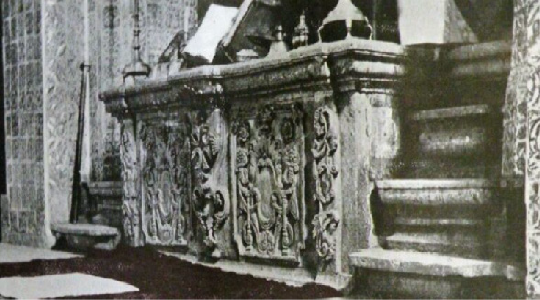By now, it is clear that Prime Minister Nikol Pashinyan’s recent attacks on the Armenian Apostolic Church are neither spontaneous nor merely political—they are deliberate, targeted and strategically aligned with foreign powers intent on eroding Armenia’s national identity. The Church, still widely regarded as a symbol of Armenian continuity, is under siege not only from Azerbaijan’s spiritual and political leaders, but, more disturbingly, from Armenia’s own head of government and his inner circle.
The current campaign began in late May, shortly after Catholicos Karekin II and Catholicos Aram I attended a high-profile World Council of Churches conference in Bern, where they denounced Azerbaijan’s ethnic cleansing of Armenians in Artsakh and called attention to the destruction of Armenian cultural heritage. In a direct response, Sheikh-ul-Islam Allahshukur Pashazade, the religious leader of Azerbaijan’s Shia Muslims and a close ally of President Ilham Aliyev, issued a statement accusing the Armenian Church of “provocative, revanchist propaganda” that endangered regional peace.
Shockingly, Pashinyan joined this chorus just days later. Accusing Church leadership of corruption and moral failure, he launched a sustained smear campaign against Catholicos Karekin II, claiming the spiritual leader had fathered a child—an act that would violate clerical celibacy. On social media, Pashinyan challenged the Church to respond publicly, asking rhetorically, “What happens when it turns out that a celibate cleric has had a child?”
But the most disgraceful moment came in another Facebook post, in which Pashinyan crudely told a cleric, “go hump your uncle’s wife”—language widely condemned across Armenian society as beneath the dignity of any public office—let alone that of the prime minister.
Equally disturbing has been the active participation of First Lady Anna Hakobyan in this campaign. She not only echoed the allegations but inserted herself into the controversy with moralistic rhetoric that further inflamed the situation. Her involvement prompted backlash, given the lack of restraint and political propriety in her engagement.
A longtime ideological opponent of the Armenian Church, Hakobyan has pushed for an overhaul of Armenia’s educational system. Her initiatives have included removing Church history from curricula, dismantling military-patriotic education, eliminating defense training in schools and reducing Armenian language instruction.
Meanwhile, Pashinyan appears to be emulating Turkish President Recep Tayyip Erdoğan’s model of state control over religious institutions. In Turkey, the government restricts the selection of Christian patriarchs, requiring state approval and citizenship for candidates. Pashinyan’s recent attacks on the Catholicos suggest an additional aim: undermining the Church’s independence to install a government-compliant spiritual authority, mirroring Turkey’s model of subordinating religious leadership to political power.
The timing of this campaign cannot be ignored. Pashinyan is set to meet with Erdoğan on June 20 to continue what he calls a “peace process.” However, many Armenians fear this “peace” is nothing more than a thinly-veiled effort to integrate Armenia into a Turkish-Azerbaijani regional bloc— effectively turning the country into a Turkic vilayet, or province, subordinate to Ankara and Baku. Rather than defend Armenian institutions like the Church on the global stage, Pashinyan has chosen to discredit them from within, echoing Azerbaijani talking points and leaving the nation culturally disarmed.
It is clear that this campaign is a distraction tool—meant to divert public attention from geopolitical concessions, the loss of Artsakh, the displacement of over 100,000 Armenians, and the government’s mounting failure to secure Armenia’s borders and sovereignty. It also coincides with ongoing border delimitation talks, which many see as additional land giveaways to Azerbaijan.Article 17 of Armenia’s Constitution guarantees the separation of church and state, while Article 18 acknowledges the unique role of the Armenian Apostolic Church in national life. Pashinyan’s directive—using state institutions to investigate celibacy violations—is a blatant breach of these provisions. As Raffy Ardhaldjian writes in Asbarez, “The involvement of state institutions in matters internal to the Church undermines the constitutional principle of church-state separation… Just as the Church has no authority to question the private lives of state officials…the state has no institutional basis to intrude into the personal conduct of clergy.”
At the very moment Azerbaijani leaders are laying claim to Etchmiadzin and calling Armenian churches “a threat to regional security,” Armenia’s own government appears to echo their disdain. The simultaneous external and internal attacks on the Church are not coincidental—they are coordinated and intended to break the last moral spine of Armenian national identity.
Despite this relentless campaign, hundreds of faithful Armenians gathered at Zvartnots Airport to welcome the Catholicos back from his overseas trip. Addressing the crowd, Karekin II said: “We know that these statements made by the prime minister have deeply disturbed our children. We must overcome this hardship. Remain strong in your faith.”
Indeed, the Church has been the cornerstone of Armenian survival through genocide, exile and occupation. To target it now—using the language of vulgarity and aligning with enemy voices to call it a destabilizing force—is not only politically reckless; it is spiritually traitorous.
In the end, what Pashinyan markets as “peace” is nothing more than “vilayetization” and submission. With lands ceded, sovereignty fractured and the nation’s spiritual heritage under assault, these attacks on the Church must be understood not as isolated provocations but as part of a strategic plan to dismantle Armenian identity and prepare the country for absorption into a Turkic hegemony.

